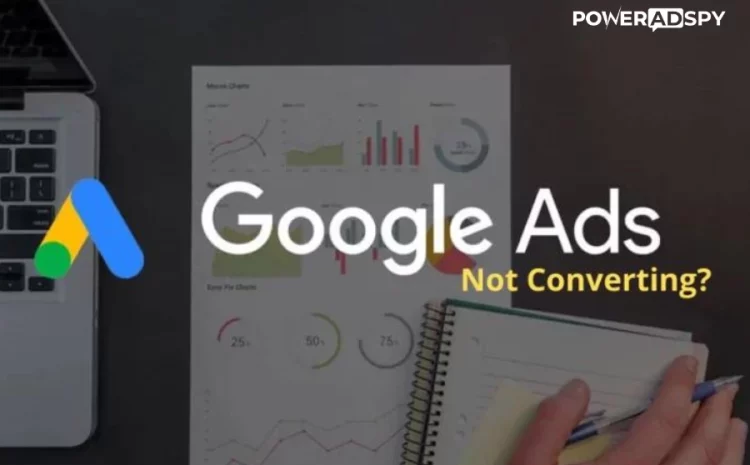5 Reasons Why Your Google Ads Aren’t Performing Well
Pay Per Click (PPC) or paid search campaigns are an essential part of a solid marketing strategy, but sometimes, Google Ads just don’t perform as well as you would’ve hoped. Marketers are human. Campaigns are complicated. In other words, it happens.
Generally, poorly performing Google Ad campaigns can be chalked up to a faulty selection of keywords or poorly written ads, but there are some sneakier reasons as to why paid search won’t convert. Research has shown that paid Google Ads have about an 11.38% CTR, and Google claims businesses generally make an ROI of $2 for every $1 spent in Google Ads. If you’re finding that your ads are performing at a less than average level, you may be making some crucial mistakes.
Your Landing Page Is Irrelevant
Having a high CTR is great, but you’re wasting money buying keywords if you can’t turn those leads into actual customers. If you’re finding that your Google Ads aren’t leading to conversions, your landing page could be at fault. Think about it this way: you can lead a horse to water, but if that horse is looking for champagne, they’re definitely not going to drink. What users land on directly after they click on your ad is the real key to driving conversions.
In 2020, Kissmetrics found that 52% of B2B PPC ads point towards a homepage rather than a landing page — but this is hardly the most effective method. Landing pages should be targeted to your specific campaign, and you should always keep what the searcher wants in mind. For example, if you’re a shoe retailer running an ad for keywords like brown suede boots, your landing page would be most effective if it specifically pointed to brown suede boots rather than your entire winter shoe collection.
Additionally, landing pages with too much information tend to have higher bounce rates. Make sure your page has clear CTAs and explains what you’re offering in about three seconds. Buyers have notoriously short attention spans, and even a small delay caused by an unoptimized mobile page can drive them away.
You’re Not Using The Right Match Types
Google Ads has three categories of keywords: broad matches, phrase matches, and exact matches. Finding the balance between them is a delicate art, but first, you have to understand how they work.
For broad match keywords, Google will display ads to people who search the term regardless of the order. Taking example, an ad with the keywords brown suede boots will show up for those who search suede boots brown or boots brown suede.
For phrase match keywords, Google will display ads to people who search the term in the exact order it’s written. Like, an ad with the keywords brown suede boots could display for a user who typed best brown suede boots or brown suede boots for sale.
For exact match keywords, Google will only display ads to people who search the exact term with no variation. An ad with the keyword brown suede boots would only show for users who type brown suede boots and not best brown suede boots.
Finding the right balance between the three match types is a delicate art. Broad matches generate more impressions, but this means that your ad may show to people who aren’t actively seeking your specific products. At the same time, phrase and exact matches have higher conversion rates but significantly fewer impressions. This could be disastrous if you’re in a niche industry with not many people searching for your products. Try starting with exact matches and expanding from there. The best campaigns have a mix of both and it’s tweaked depending on results.
Related Posts:
Coronavirus Outbreak: Online Media Flooded With Awareness Advertisements
What You Can And Can’t Advertise During The COVID-19 Pandemic?
05 Tips To Exercise Safe & Responsible Marketing During COVID 19
You Forgot People Have A One-Track Mind
There’s a simple golden rule to running Google ads: searchers have a one-track mind. Sure, you may think that if you’re advertising laptop bags, you may also want to market to people who are also searching for laptops. That may work if you’re upselling at a brick and mortar location, but it doesn’t work for search engines.
If your Google Ad isn’t performing well, refocus your keywords. You can find which keywords are performing well by spying on the adwords of your competitors by using an Google ad spy tool like PowerAdSpy. Don’t waste money buying loosely related keywords. Laser-focus your campaign on converting people who are already searching for what you’re selling.
Negative Keywords Are Killing You
Negative keywords are great in theory. When used properly, they prevent your ads from matching with irrelevant searches, but improper usage can actually negate your active keywords. You can fix this simple.
Going with the above example, you’re bidding on the phrase match keywords brown suede shoes and have set brown suede as a broad match negative keyword in order to filter out people looking for wholesale fabric rather than shoes. Unfortunately, this would accidentally cancel out the active phrase and your ad would show to neither potential consumer. To fix this, you’d need to switch brown suede to an exact match negative.
You’ve Got An Unfocused Ad Group
Ad groups within Google Ads consist of two components: keywords and ads. Keywords and ads in the same ad groups are tied together, so when someone searches one of your keywords, Google automatically selects an ad within the group. How do you know if the ad is relevant? Well, you don’t, and that’s why unfocused ad groups can lead to disastrous results.
If your Google Ads campaign hasn’t been successful and you’ve got ad groups with keywords that aren’t closely related, try tweaking your ad groups. These groups should be closely related enough that they’ll be relevant to a search query regardless of which ad Google selects.
Conclusion:
Google Ads can be a powerful tool for marketing, but it’s common to face challenges. Understanding why your ads aren’t performing well is crucial. Whether it’s about targeting the right audience, refining your keyword strategy, or improving your landing page, addressing these issues can significantly boost your campaign’s success. By making necessary adjustments and focusing on relevancy, you can maximize the effectiveness of your Google Ads and drive better results for your business, improving ctr in Google ads.






